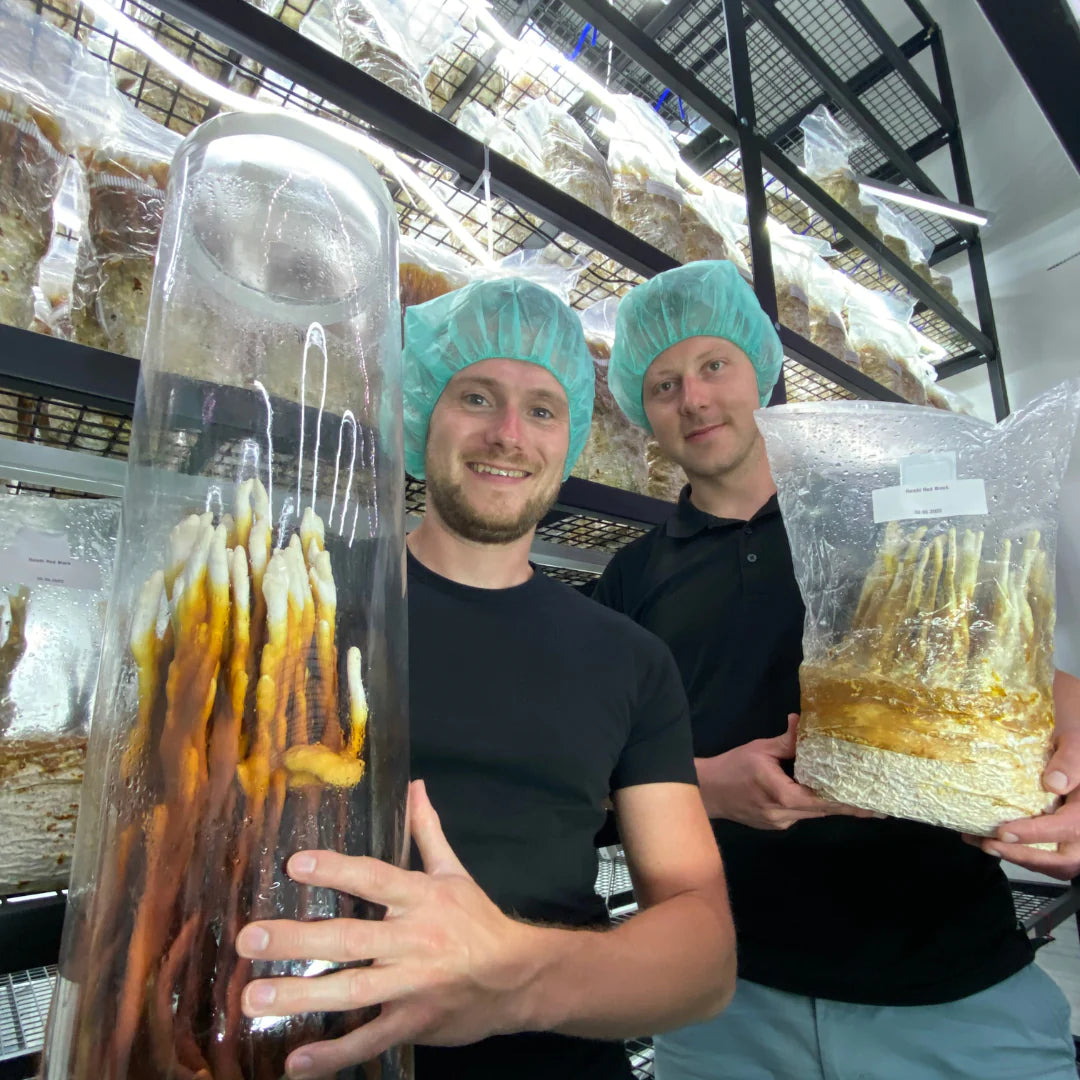

Sprache

Studiensammlung
Vitalpilze sind seit Jahrhunderten fester Bestandteil traditioneller und ganzheitlicher Gesundheit. Von der Traditionellen Chinesischen Medizin (TCM) bis hin zur modernen Mykotherapie. Heute bestätigt auch die Wissenschaft zunehmend das, was alte Kulturen längst wussten: Vitalpilze stecken voller bioaktiver Stoffe mit beeindruckendem Potenzial.
Wir bei smaints sind überzeugt, dass Transparenz und Fakten die Basis für Vertrauen sind. Deshalb haben wir für dich eine Sammlung wissenschaftlicher Studien zu den Inhaltsstoffen unserer Produkte zusammengestellt. So kannst du selbst entdecken, welche spannenden Effekte die Forschung beschreibt.
Wichtiger Hinweis (Disclaimer): Aufgrund gesetzlicher Regelungen ist es uns leider untersagt, zu bestimmten Inhaltsstoffen unserer Produkte spezifische Heil- oder Wirkversprechen zu treffen. Dies ist der Grund, weshalb bei einigen Produkten nur sehr wenige Informationen zur Wirkung zu finden sind. Wir haben daher umso mehr darauf geachtet, Studien zu den Inhaltsstoffen unserer Produkte zu finden, um die Wirksamkeit zu bestätigen und Transparenz zu schaffen. Die Studien dienen ausschließlich zu Informationszwecken und ersetzen keine medizinische Beratung. Darüber hinaus kannst du selbst Recherche betreiben und dir dein eigenes Bild von unseren Produkten machen. Wir bitten um Verständnis dafür.
Studien zu Cordyceps
„Supplemental anti-fatigue effects of Cordyceps sinensis (Tochu-Kaso) extract powder during three stepwise exercise of human.”, Nagata et al. 2006; Lin & Li 2011
„Effect of Cs-4 (Cordyceps sinensis) on exercise performance in healthy older subjects: a double-blind, placebo-controlled trial.”, Chen, S., Li, Z., Krochmal, R., Abrazado, M., Kim, W., & Cooper, C. B. (2010)
„Randomized double-blind placebo-controlled clinical trial and assessment of fermentation product of Cordyceps sinensis (Cs-4) in enhancing aerobic capacity and respiratory function of the healthy elderly volunteers”, Xiao Yi, Huang Xi-zhen & Zhu Jia-shi (2004).
„Improvement of Learning and Memory Induced by Cordyceps Polypeptide Treatment and the Underlying Mechanism.”, Yuan, G., An, L., Sun, Y., Xu, G., & Du, P. (2018).
„Dual-Directional Immunomodulatory Effects of Corbrin Capsule on Autoimmune Thyroid Diseases“. He, X. et al. 2016
Studien zu Hericium (Lions Mane)
„Improvement of Cognitive Functions by Oral Intake of Hericium Erinaceus.", Saitsu, Y., A. Nishide, K. Kikushima, K. Shimizu, and K. Ohnuki.
„Improving effects of the mushroom Yamabushitake (Hericium erinaceus) on mild cognitive impairment: a double-blind placebo-controlled clinical trial.”, K. Mori, S. Inatomi, K. Ouchi, Y. Azumi, T. Tuchida
„Effect of erinacine A-enriched Hericium erinaceus supplementation on cognition: A randomized, double-blind, placebo-controlled pilot study“, Maša Černelič Bizjak, Zala Jenko Pražnikar, Saša Kenig, Matjaž Hladnik, Dunja Bandelj, Andrej Gregori, Katja Kranjc (2024).
“Hericenones and erinacines: stimulators of nerve growth factor (NGF) biosynthesis in Hericium erinaceus.”,Bing-Ji Ma, Jin-Wen Shen, Hai-You Yu, Yuan Ruan, Ting-Ting Wu & Xu Zhao (2010)
„Lion’s Mane Mushroom (Hericium erinaceus): A Neuroprotective Fungus with Antioxidant, Anti-Inflammatory, and Antimicrobial Potential – A Narrative Review“, Alex Graça Contato & Carlos Adam Conte-Junior (2025).
„Prevention of Early Alzheimer’s Disease by Erinacine A-Enriched Hericium erinaceus Mycelia: A Pilot Double-Blind Placebo-Controlled Study“, I-Chen Li, Han-Hsin Chang, Chuan-Han Lin, Wan-Ping Chen, Tsung-Han Lu, Li-Ya Lee, Yu-Wen Chen, Yen-Po Chen, Chin-Chu Chen & David Pei-Cheng Lin (2020).
„Extracts from Hericium erinaceus relieve inflammatory bowel disease by regulating immunity and gut microbiota“. Diling, C. et al. (2017).
Studien zu Chaga
„Immunostimulating activity by polysaccharides isolated from fruiting body of Inonotus obliquus.”, Won, D. P., Lee, J. S., Kwon, D. S., Lee, K. E., Shin, W. C., & Hong, E. K. (2011).
“Inonotus obliquus polysaccharide regulates gut microbiota of chronic pancreatitis in mice.”, Hu, Y., Teng, C., Yu, S., Wang, X., Liang, J., Bai, X., Dong, L., Song, T., Yu, M., & Qu, J. (2017).
“Aqueous extract from a Chaga medicinal mushroom, Inonotus obliquus (higher Basidiomycetes), prevents herpes simplex virus entry through inhibition of viral-induced membrane fusion.”, Pan, H. H., Yu, X. T., Li, T., Wu, H. L., Jiao, C. W., Cai, M. H., Li, X. M., Xie, Y. Z., Wang, Y., & Peng, T. (2013).
„Antiviral activity of Inonotus obliquus fungus extract towards infection caused by hepatitis C virus in cell cultures.”, Shibnev, V. A., Mishin, D. V., Garaev, T. M., Finogenova, N. P., Botikov, A. G., & Deryabin, P. G. (2011).
„Antioxidative properties of crude polysaccharides from Inonotus obliquus.”, Mu, H., Zhang, A., Zhang, W., Cui, G., Wang, S., & Duan, J. (2012).
Studien zu Shiitake
„The Effects of AHCC®, a Standardized Extract of Cultured Lentinura edodes Mycelia, on Natural Killer and T Cells in Health and Disease: Reviews on Human and Animal Studies.” Shin, M. S., Park, H. J., Maeda, T., Nishioka, H., Fujii, H., & Kang, I. (2019).
„Consuming Lentinula edodes (Shiitake) Mushrooms Daily Improves Human Immunity: A Randomized Dietary Intervention in Healthy Young Adults.”, Dai, X., Stanilka, J. M., Rowe, C. A., Esteves, E. A., Nieves, C., Jr, Spaiser, S. J., Christman, M. C., Langkamp-Henken, B., & Percival, S. S. (2015).
„Effects of Shiitake Culinary-Medicinal Mushroom, Lentinus edodes (Agaricomycetes), Bars on Lipid and Antioxidant Profiles in Individuals with Borderline High Cholesterol: A Double-Blind Randomized Clinical Trial. “, Spim, S. R. V., Pistila, A. M. H., Pickler, T. B., Silva, M. T., & Grotto, D. (2021).
Studien zu Mandelpilz
„Antitumor, Anti-Inflammatory and Antiallergic Effects of Agaricus blazei Mushroom Extract and the Related Medicinal Basidiomycetes.”, Hetland, G., Tangen, J. M., Mahmood, F., Mirlashari, M. R., Nissen-Meyer, L. S. H., Nentwich, I., Therkelsen, S. P., Tjønnfjord, G. E., & Johnson, E. (2020).
“The Mushroom Agaricus blazei Murill Elicits Medicinal Effects on Tumor, Infection, Allergy, and Inflammation through Its Modulation of Innate Immunity and Amelioration of Th1/Th2 Imbalance and Inflammation.” Hetland, G. et al. 2011
“Antitumor, Anti-Inflammatory, and Antiallergic Effects of Agaricus blazei Mushroom Extract and the Related Medicinal Basidiomycetes Mushrooms.” Hetland, G. et al., 2020
„Agaricus blazei-Based Mushroom Extract Supplementation to Birch Allergic Blood Donors: A Randomized Clinical Trial.”, Mahmood, F., Hetland, G., Nentwich, I., Mirlashari, M. R., Ghiasvand, R., & Nissen-Meyer, L. S. H. (2019).
Studien zu Maitake
„Griflola frondosa (GF) produces significant antidepressant effects involving AMPA receptor activation in mice.”, Bao, H., Ran, P., Sun, L., Hu, W., Li, H., Xiao, C., Zhu, K., & Du, J. (2017).
„Anti-hyperliposis effect of maitake fruit body (Grifola frondosa). I.”, Kubo, K., & Nanba, H. (1997).
„Maitake (Grifola frondosa) improve glucose tolerance of experimental diabetic rats.”, Horio, H., & Ohtsuru, M. (2001).
„Maitake mushroom (Grifola frondosa) extract induces ovulation in patients with polycystic ovary syndrome: a possible monotherapy and a combination therapy after failure with first-line clomiphene citrate.”, Chen, J. T., Tominaga, K., Sato, Y., Anzai, H., & Matsuoka, R. (2010).
Studien zu Reishi
„Ganoderma lucidum Effects on Mood and Health-Related Quality of Life in Women with Fibromyalgia.”, Pazzi, F., Adsuar, J. C., Domínguez-Muñoz, F. J., García-Gordillo, M. A., Gusi, N., & Collado-Mateo, D. (2020).
„Triterpenoids and polysaccharide peptides-enriched Ganoderma lucidum: a randomized, double-blind placebo-controlled crossover study of its antioxidation and hepatoprotective efficacy in healthy volunteers.”, Chiu, H. F., Fu, H. Y., Lu, Y. Y., Han, Y. C., Shen, Y. C., Venkatakrishnan, K., Golovinskaia, O., & Wang, C. K. (2017).
„A Phase I/II Study of Ling Zhi Mushroom Ganoderma lucidum (W.Curt.:Fr.)Lloyd (Aphyllophoromycetideae) Extract in Patients with Type II Diabetes Mellitus.”, Yihuai Gao et al. 2004
“Anti-inflammatory Activities of Ganoderma lucidum (Lingzhi) and San-Miao-San Supplements in MRL/lpr Mice for the Treatment of Systemic Lupus Erythematosus” Cai, Zhe et al., 2016